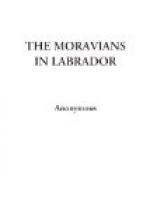The children likewise had their meetings, in which they sung hymns and prayed, during which they were frequently so sensibly affected that they would burst out into weeping. A boy who gave evidence of being truly awakened, called upon the missionaries and told them, “We boys have been sitting together by ourselves and speaking, both of our own sinfulness and of the mercy we have experienced from our Saviour. At the close of our conversation we kneeled down and prayed to him in fellowship, that he would deliver us from all power of sin, during which my heart grew so warm that I felt it penetrate to my feet”—a phrase used by the Esquimaux to express great inward joy. “Jesus,” continued he, “was very near us. I will give him my whole heart as his property.” The schools were diligently attended, both by young and old, whose improvement in Christian knowledge, and in the facility of reading, advanced steadily, while several among the scholars evinced a strong desire to know Jesus, and live to him. But at Okkak in the following year an unusual emotion appeared among the scholars. One day, while the teachers were closing the schools as usual by singing a verse, there arose such an affection of heart, that all melted into tears, and at last without any direction they all fell on their knees. The missionary, therefore, who was keeping the school knelt down also, and was powerfully excited to fervent prayer for these dear little ones, commending them to the grace of the Saviour, that he would preserve them from the many snares of Satan, and sanctify and build them up in the faith. Some of the more advanced youths gave the missionaries much pleasure by their simplicity and frankness in speaking of their hearts; two of them—companions—conversing with one of the brethren, said, “When we are out together hunting we speak of Jesus and pray to him, and often feel such power and happiness in thinking of him that we weep for joy. But how is it that we have so long heard of him, and he is but just now become precious to us?” They could not explain the phenomenon; but they felt that a long train of historical proof, or of external evidence, was unnecessary to establish the authenticity of the gospel-message. “How is it,” added one of them, “that formerly I used to think—It is all fiction! There is no Jesus! And now I know in truth that Jesus lives and loves me, and sometimes draws so near to me that I weep for gratitude and delight. To him I will give myself both soul and body.”
In the back ground, at the distance, stand out in horrible and melancholy contrast the effects of satanic influence on the conduct of his votaries. The wife of the old sorcerer, Uiverunna, having died, the old monster seized a poor orphan child, whom they had formerly adopted, and murdered him; then cut him across all the joints of his fingers and toes, ripped open his belly, and threw the body naked into the sea, an offering to appease the wrath of the water-devil




